The peaceful transfer of power…
March 10, 2014 by GuyHeilenman · Leave a Comment
As we approach President’s Day, there is a part of me which is somewhat sentimental about my childhood memories surrounding Washington’s Birthday. I sure do miss it as a stand alone national celebration. I fondly remember my father bringing home a cardboard version of an ax (with a chocolate-covered cherry hidden within) to present to each of us to commemorate the holiday, and without fail, reminding us to be just like George Washington – that is, to never tell a lie. Was there a bit of lore surrounding this sacred event? Sure. Did it teach us a valuable lesson? Absolutely. Somehow we’ve lost the innocence and value of oral tradition, and I wonder if we are the better for it.
Perhaps Washington never chopped down a cherry tree… and my guess is he probably told a lie at some point, but I challenge anyone to name another political leader who, in the face of such power, tradition, and popularity, was willing to hand over the reigns of power with such humility and grace. The Massachusetts Spy, Or Worcester Gazette for March 15, 1797 records much of the proceedings of this momentous event. The link provides access to considerable details. Of particular note is his response to the Massachusetts’ Representatives of Congress who basically asked him, “What now?” His response is precious (see below). Please enjoy!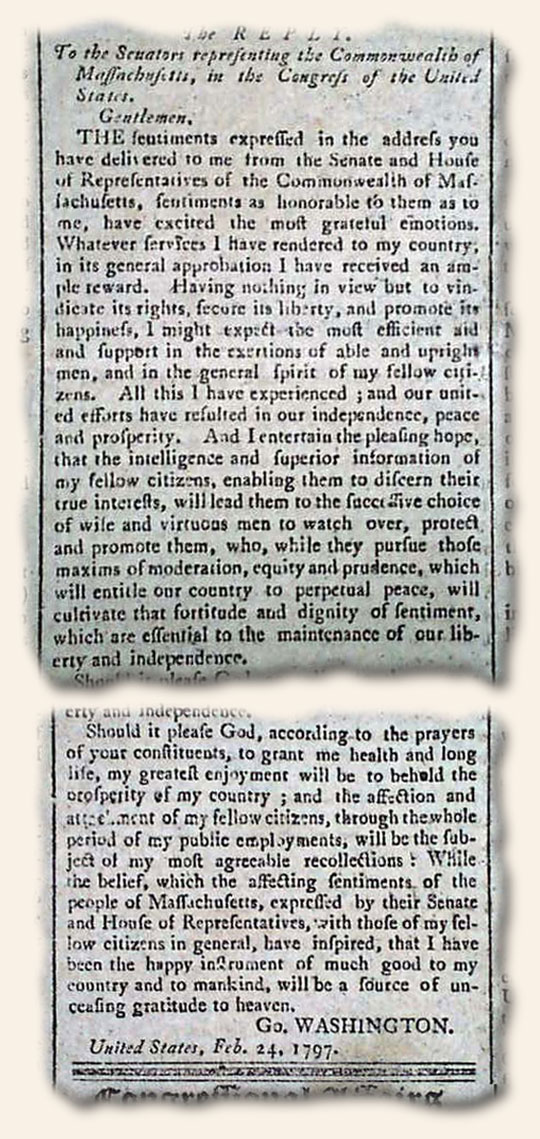
Discovering the eloquence of Washington…
October 14, 2013 by TimHughes · Leave a Comment
One of the benefits of collecting notable newspapers is not only the joy of finding an historically significant report–like Washington’s proclamation announcing the formal end of hostilities with England–but appreciating the eloquence of our leaders of years past. With all our modern intelligence & computer-enabled resources at our fingertips, it seems like the simple skill of writing has been lost with our generation.
The referenced event was recently discovered in the “Pennsylvania Journal & Weekly Advertiser” newspaper of April 30, 1783. Page two contains this very historic report, but of equal fascination is the wording of the document. He congratulates the Army, noting that those who have performed the “…meanest office…” have participated in a great drama “…on the stage of human affairs…For these are the men who ought to be considered as the pride and boast of the American Army; And, who crowned with well earned laurels, may soon withdraw from the field of Glory, to the more tranquil walks of civil life…Nothing now remains but for the actors of this mighty Scene to preserve a perfect, unvarying, consistency of character through the very last act; to close the Drama with applause; and to retire from the Military Theatre with the same approbation of Angels and men which have crowned all their former virtuous actions.” There is evidence of Washington’s less formal and more pedestrian side as well as he ends the document with: “An extra ration of liquor to be issued to every man tomorrow, to drink Perpetual Peace, Independence and Happiness to the United States of America.” See this hyperlink for the full text (or the text of the actual newspaper below).
What a thrill to find such a document which has rested on our shelves for many years just waiting to be discovered. What a thrill to be involved in such a fascinating hobby.
Collecting the Revolutionary War on a budget…
March 28, 2013 by TimHughes · 2 Comments
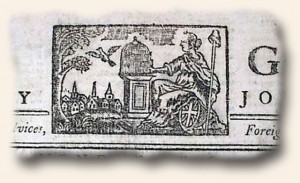 I would argue that beyond the Civil War, the era of American history which evokes the most interest among our collectors is unquestionably the Revolutionary War. With a cast of characters who still rank among the most memorable in history—Washington, Adams, Hancock, Jefferson, Henry, Franklin, Paine, and more—and a plot, which if it were not true history would serve as an excellent screenplay for an exciting movie—an oppressed, energized people seek to break free from the reigns of oppression and dominance from abroad—it is easy to see how the events of the Revolutionary War continue to intrigue and offer a foundation upon which to reflect as today’s world grapples with many of the same issues despite the 230+ years which distance us from those notable events.
I would argue that beyond the Civil War, the era of American history which evokes the most interest among our collectors is unquestionably the Revolutionary War. With a cast of characters who still rank among the most memorable in history—Washington, Adams, Hancock, Jefferson, Henry, Franklin, Paine, and more—and a plot, which if it were not true history would serve as an excellent screenplay for an exciting movie—an oppressed, energized people seek to break free from the reigns of oppression and dominance from abroad—it is easy to see how the events of the Revolutionary War continue to intrigue and offer a foundation upon which to reflect as today’s world grapples with many of the same issues despite the 230+ years which distance us from those notable events.
And what could be better than experiencing those events just as those who lived through them? Newspapers offer that opportunity. Genuine issues, once held and read by those who lived through those turbulent days before being relegated to the back shelves of libraries, are now part of the inventory of Hughes Rare & Early Newspapers. And at prices which might surprise many (see Revolutionary War issues for $60 and under), as a hobby which is relatively unknown to the collecting world has yet to cause demand and scarcity to drive prices beyond the means of the average collector. Of course, there are still many that fall into the category of what we refer to as, “The Best of the Best – Revolutionary War Edition“.
Of significance is that British titles, which offer excellent coverage of all American events given their role in attempting to placate the demands of the Americans while maintaining control of their colonies, allow ownership of battle reports of the war for under $100, with 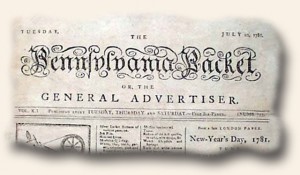 some very notable events in the $200-$300 range. American newspapers remain among the most desired but their scarcity is reflected in their prices. With a collection of the “Pennsylvania Evening Post” which included the Declaration of Independence bringing $600,000 in auction recently, it would amaze many that the same document is available in London’s “Gentleman’s Magazine” issue of August, 1776 (took news 3-4 weeks to traverse the Atlantic) for under $4,000. Other disproportionate prices between British and American newspapers entice many to gravitate to the British titles while prices and availability remain attractive.
some very notable events in the $200-$300 range. American newspapers remain among the most desired but their scarcity is reflected in their prices. With a collection of the “Pennsylvania Evening Post” which included the Declaration of Independence bringing $600,000 in auction recently, it would amaze many that the same document is available in London’s “Gentleman’s Magazine” issue of August, 1776 (took news 3-4 weeks to traverse the Atlantic) for under $4,000. Other disproportionate prices between British and American newspapers entice many to gravitate to the British titles while prices and availability remain attractive.
The “London Chronicle” is one of the better British titles in reporting the Revolutionary War. From the Battle of Lexington and Concord, to Bunker Hill, Battle of New York, Saratoga, Washington crossing the Delaware, treason of Benedict Arnold, Guilford Court House, to Cornwallis’ surrender at Yorktown, this newspaper offers coverage which equals the American newspaper accounts. In fact many British reports were taken verbatim from American newspapers. Of equal quality in report news of the day was the “Edinburgh Evening Courant” from Scotland as I have found all events of the Revolutionary War to be reported in this title as well. Other UK titles which covered the war include “The Glocester Journal”, “Aris’s Birmingham Gazette”, the “Edinburgh Advertiser” and the “Glasgow Mercury” to name a few.
But perhaps the best and most available title of the Revolutionary War period would be the “Gentleman’s Magazine” from London, it having a long printing history from 1731 to the 20th century so it encompasses not just the Revolutionary War in great detail by the entire scope of American history. As an added treat this title typically included one of more plates within each issue, which included maps as well. And during the years of the Revolutionary War were found many maps of American colonies, battle sites as well as large foldout maps showing the entire scope of the united colonies at that time. The maps alone have found a keen interest among collectors, separate from the issues in which they were stored for over 200 years. As is true with the British titles mentioned, “Gentleman’s” included all notable events and documents, including the Articles of Confederation, the Causes and Necessity For Taking Up Arms, all major battles of the war thru the treaty between Washington and Cornwallis, and even the document by King George III which officially ended the war. And all the major names of the war from both the British and American sides have found their way into the pages of “Gentleman’s Magazine”.
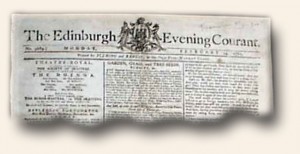 American titles are available as well. Some of the more rare would be those from the South which are virtually impossible to find, and when they do surface their prices are beyond the means of most collectors. Some of the more commonly found titles would be the “Pennsylvania Evening Post” from Philadelphia, the “Pennsylvania Ledger” “Boston Gazette” (which featured an engraving by Paul Revere in the masthead), “The Pennsylvania Gazette” and “Pennsylvania Packet” among others. And dipping back a few years before the outbreak of the war, when tensions were building with much evidence in the newspapers of the day, the “Pennsylvania Chronicle” and the “Boston Chronicle” offer excellent insight into events of the day from the years 1767-1769 for under $200 for most issues.
American titles are available as well. Some of the more rare would be those from the South which are virtually impossible to find, and when they do surface their prices are beyond the means of most collectors. Some of the more commonly found titles would be the “Pennsylvania Evening Post” from Philadelphia, the “Pennsylvania Ledger” “Boston Gazette” (which featured an engraving by Paul Revere in the masthead), “The Pennsylvania Gazette” and “Pennsylvania Packet” among others. And dipping back a few years before the outbreak of the war, when tensions were building with much evidence in the newspapers of the day, the “Pennsylvania Chronicle” and the “Boston Chronicle” offer excellent insight into events of the day from the years 1767-1769 for under $200 for most issues.
Regardless of your interest in the Revolutionary War, whether it be the famous names that came to prominence, the battles of the war, or a focus on a singular event or locality, genuine newspapers of the day are available for the collector. It is a hobby with limitless possibilities, and offers a unique opportunity to literally hold history in your hands.
Summing up the Revolutionary War through 1779…
January 25, 2013 by TimHughes · Leave a Comment
The front page of “The Edinburgh Advertiser“, July 23, 1779, has a great letter (see below) signed by “An Englishman” which pretty much sums up the Revolutionary War through the mid-point of 1779. Never before have I seen a more accurate appraisal of the situation in so few words.
George Washingon speaks out…
December 21, 2012 by GuyHeilenman · Leave a Comment
 As the so-called fiscal cliff rapidly approaches and political tension fills the air, let’s take time to reflect on a time when unity of spirit & purpose under the blessing of God were all we had going for us… and as time would quickly show, it was all that we needed. The September 3, 1777 issue of the Edinburgh Evening Currant, Scotland, contains George Washington’s Manifesto of America. As Tim Hughes describes it:
As the so-called fiscal cliff rapidly approaches and political tension fills the air, let’s take time to reflect on a time when unity of spirit & purpose under the blessing of God were all we had going for us… and as time would quickly show, it was all that we needed. The September 3, 1777 issue of the Edinburgh Evening Currant, Scotland, contains George Washington’s Manifesto of America. As Tim Hughes describes it:
I’m not sure I’ve seen a newspaper from the UK so replete with American content than this one. One-third of the front page is taken up with the complete & lengthy text of: “The Manifesto of America, By George Washington, Esq., Commander in Chief of the Forces of the United States, In answer to General Burgoyne’s Proclamation“. This document begins: “The associated armies of America act from the noblest motives, and for the purest purposes. Their ‘common principle’ is virtue, their ‘common object’ is Liberty!…” followed by a litany of eloquence which must be read. In the document he makes much reference to Christian values and the guidance of God, bits including: “…that the content has been made a foundation for the completed system of tyranny that ever God, in his displeasure, suffered for a time to be exercised over a forward & stubborn generation…Thus hath God, in his divine and just displeasure, suffered for a time, the exercise of the completest system of tyranny…In our consciousness of Christianity we pray, in all humility, for peace and good will among men, & invite all nations to mutual friendship and brotherly love. These truly Christian objects, we conceive, are to be attained only by Christian means…” and near the end: “…Its event we submit to Him, who speaks the fate of nations, in humble confidence, that as his omniscient eye taketh note even of the sparrow that falleth to the ground, so he will not withdraw his countenance from a people who humbly array themselves under his banner in defence of the noblest principles with which he hath adorned humanity.” The document is signed in type: George Washington.
To view the entire content along with images, please go to: Washington’s Manifesto
Reading the entire Manifesto of America will be worth your time!
Believe it or not…
May 4, 2012 by GuyHeilenman · Leave a Comment
While posting an October 31, 1804 issue of THOMAS’S MASSACHUSETTS SPY, OR WORCESTER GAZETTE, Massachusetts, onto the Rare Newspapers website due to the presence of two letters from George Washington (written before 1800) and another from Thomas Jefferson, another item caught our interest. Under “Deaths” we found an obituary which seems unbelievable. Which is harder to believe, that newspapers from 1804 containing 3 Presidential letters are still available, or, that the details within the shown obituary are true? Fact or fiction? You decide.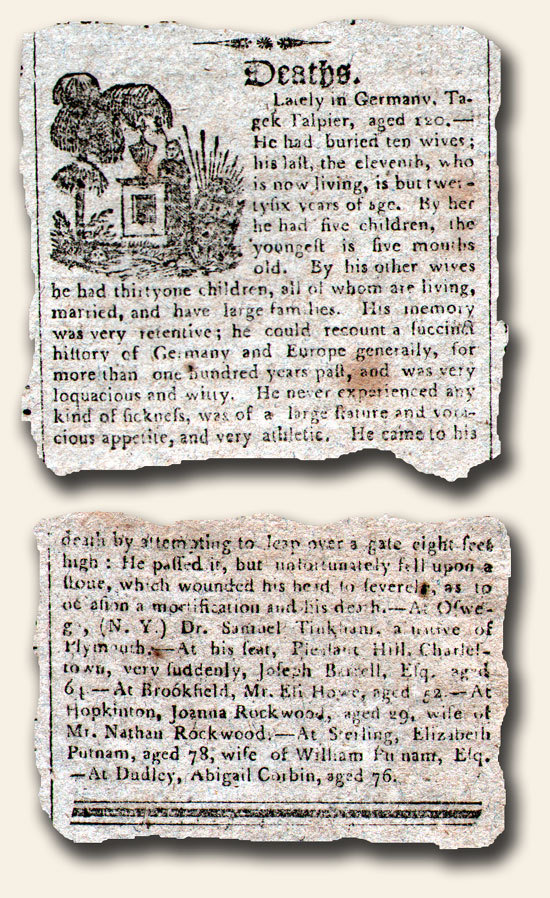
Happy Passover… Happy Easter…
April 6, 2012 by GuyHeilenman · Leave a Comment
President George Washington is known for his letters to various Hebrew congregations (Newport, Savannah, etc.) and churches which are filled with spiritual references. Considering the recipients, such language might be expected even if the writer was not a person of faith. However, the following is a speech he gave to the leaders of Philadelphia upon his visit to the city while in transit to New York to take the oath of office. At a time when he could have said anything, what he chose to say and how he chose to say it speaks volumes. Please enjoy his address as it appeared in The Massachusetts Centinel, May 2, 1789: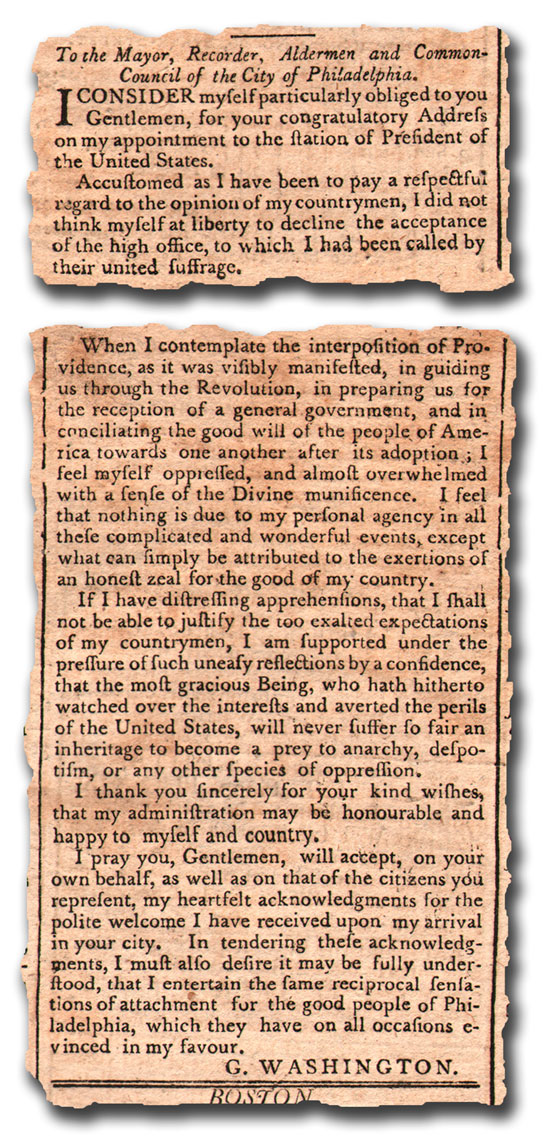
The Traveler… an honorable military by George Washington… snow-canoeing, where???
February 20, 2012 by The Traveler · Leave a Comment
Today’s travels brought me to the Boston Gazette of February 20, 1812 where I found a continuing discussion about Captain Henry Purkitt and his removal from an official position. This lead to the inclusion of his honorable discharge which was signed by “G. Washington” for his seven years and one month of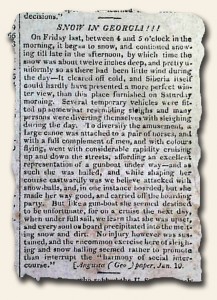 faithful service. In doing some internet researching, I found that he was one of the youth that was a participant in the Boston Tea Party!
faithful service. In doing some internet researching, I found that he was one of the youth that was a participant in the Boston Tea Party!
A report of Georgia receiving twelve inches of snow in one day was quite interesting! “…To diversify the amusement, a large canoe was attached to a pair of horses, and with a full complement men, and with colours flying, went with considerable rapidity cruising up an down the streets, affording an excellent representations of a gunboat under way… but like a gun-boat she seemed destined to be unfortunate… we learn that she was upset and every soul on board precipitated into the melting snow and dirt…” There was also mention of snowballs being thrown as well. I guess snow-canoeing never really took off though as it hasn’t made it into the Winter Olympics… yet!
~The Traveler
She prepared for the end…
February 21, 2011 by TimHughes · Leave a Comment
Some news reports we discover in our newspapers are so beautifully written that they beg to be share with more than just the collector who buys the issue. This is one. Not only is the report of Martha Washington’s death eloquently presented, it is interesting how she knew her time was coming to an end and was prepared for it.
This report appeared in the “Farmer’s Museum or Literary Gazette” from Walpole, New Hampshire, June 8, 1802:
Recommended reading…
June 26, 2010 by GuyHeilenman · Leave a Comment
 Jim Wheeler, one of our “rare newspaper” friends, recently sent us an e-mail with the following recommendation for our summer reading list:
Jim Wheeler, one of our “rare newspaper” friends, recently sent us an e-mail with the following recommendation for our summer reading list:
The Constitutional Convention: A Narrative History from the Notes of James Madison, by Edward J. Larson & Michael P. Winship, ISBN 0-8129-7517
This book essentially condenses and annotates Madison’s notes taken throughout the Convention so that the language and the important concepts that were discussed can be understood today. The book includes a list of those attending the convention and their respective states. When you keep a 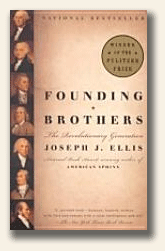 copy of this list handy while reading the notes, you can get a clear picture of the regional motives behind the discussion as the constitution was developed. This book, in conjunction with The Founding Brothers, John Ellis, were both extremely helpful in developing a working understanding of what I consider to be one of the most interesting 10 to 20 year time period in US history.
copy of this list handy while reading the notes, you can get a clear picture of the regional motives behind the discussion as the constitution was developed. This book, in conjunction with The Founding Brothers, John Ellis, were both extremely helpful in developing a working understanding of what I consider to be one of the most interesting 10 to 20 year time period in US history.
I thought that in addition to all of your other reading, these two items may be interesting and helpful.
Thanks for your suggestions Jim. To the readers of this post: “If you have a chance to read either of these (or have already done so), the community would love to hear your reactions as well.


